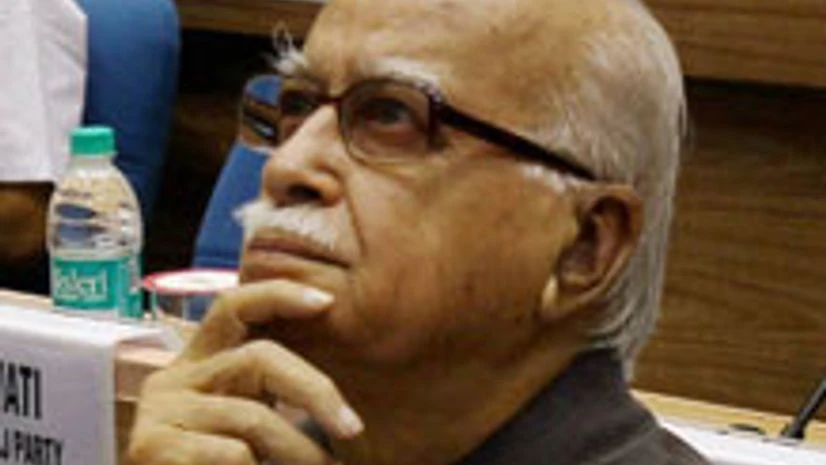Bharatiya Janata Party (BJP) senior L K Advani, whose public utterances have been extremely rare in the past year, has said the forces that can crush democracy are stronger today. He has also said he fears a repeat of the draconian Emergency.
"Today, I do not say the political leadership is not mature. But there are weaknesses, so I don't have faith. I don't have the confidence that it (Emergency) cannot happen again," Advani said in an interview published in The Indian Express on Thursday.
Advani's comments, a week before the 40th anniversary (June 25) of the 19-month Emergency from mid-1975 to early 1977, was interpreted by Opposition leaders as the veteran's criticism of Prime Minister Narendra Modi's growing personality cult and the lack of internal democracy within BJP.
More From This Section
| TROUBLES APLENTY |
|
During the Emergency, the Indira Gandhi government of the day had curtailed all civil liberties, imprisoned thousands of political workers, including Advani, and put severe curbs on the media.
"India is Indira, Indira is India," is how Congressmen like D K Barooah extolled the then prime minister's personality cult.
The Nationalist Congress Party's D P Tripathi, a member of Parliament today, had also spent 14 months in jail during the Emergency. He said Advani's observation might be on the "personalised autocratic tendencies within his own party".
Former CPI (M) General Secretary Prakash Karat thought the present crises facing the country had the potential for a repeat of the Emergency.
Similarly, Delhi Chief Minister Arvind Kejriwal, currently jousting with the Modi government over the control of levers of governance in Delhi, was forthright on Thursday in tweeting how Delhi could be Modi government's first experiment.
In the interview, Advani did not make any direct reference to Modi, but some of his comments were interpreted as such. "At the present point of time, the forces that can crush democracy, notwithstanding the constitutional and legal safeguards, are stronger," Advani said. He also said there were not "enough safeguards in India in 2015".
Seen in this context, the timing of the interview is intriguing. External Affiars Minister Sushma Swaraj is a protege of Advani. The leader, who treats Swaraj like his daughter, was unlikely not to be upset about how she had been left to fend for herself by both the party and the government. Amid a controversy over Swaraj allegedly having helped former Indian Premier League commissioner Lalit Modi, Prime Minister Modi is yet to speak, even after five days since the controversy first broke.
However, a source close to Advani asserted that the interview was "only in the context of the Emergency". "He isn't somebody to mince words. He would have been forthright about the Modi government if he wanted to," the source said.
Former Rashtriya Swayamsevak Sangh (RSS) leader M G Vaidya said it was unlikely Advani was trying to send Modi a message through this interview. "He is senior in age and experience. So he can talk to Modi directly," Vaidya said. There, however, was no official comment from RSS, an outfit with which Advani mostly fell out after his praise of Pakistan's founder Muhammad Ali Jinnah in 2005.
Advani, the BJP's prime ministerial candidate for the 2009 Lok Sabha elections, is currently a member of the party's 'Margdarshak Mandal' (mentor group). He was dropped from BJP's parliamentary party, its highest decision-making body, and included in the newly constituted 'mandal' in August 2014. The 'mandal' is yet to a meeting. In April, Advani had refused to address the opening session of BJP's national executive in Bengaluru. It was only the second such occasion since the party was founded in 1980 - the first being the national executive in Goa in 2013 which Advani had skipped and where Modi was elected the party's prime ministerial candidate for the 2014 elections.
In the interview, Advani bemoaned how precious little had been done to give him the assurance that civil liberties would not be suspended or destroyed again, like during the Emergency. "I think there isn't adequate awareness about and commitment to civil liberties and the freedom of the press," he said.
Advani also said India needed to strengthen the forces of democracy to avoid a repeat. "But strengthening them cannot in any way be helped by underplaying the guilt of those responsible. We need to talk about the system's flaws but not in a way that there is no conversation about guilt." He said while the partition was British guilt, "the Emergency is ours".
"I do not see any sign in our polity that assures me of an outstanding aspect of leadership. A commitment to democracy and to all other aspects related to democracy is lacking. From what I can see, the number of people committed to democracy and civil liberties in this generation is going down," Advani said.
He said people of his generation, who gave him the confidence that they would not compromise democracy and civil liberties for personal or group advantage "are to be seen less and less".
He also said Anna Hazare's anti-corruption movement had been a disappointment. "Certain sections of the press might have become more alert. The media is more independent today. But does it have a real commitment to democracy and civil liberties - I don't know," he said, identifying the judiciary as the most responsible among institutions to be held responsible for a well-functioning democracy.

)
